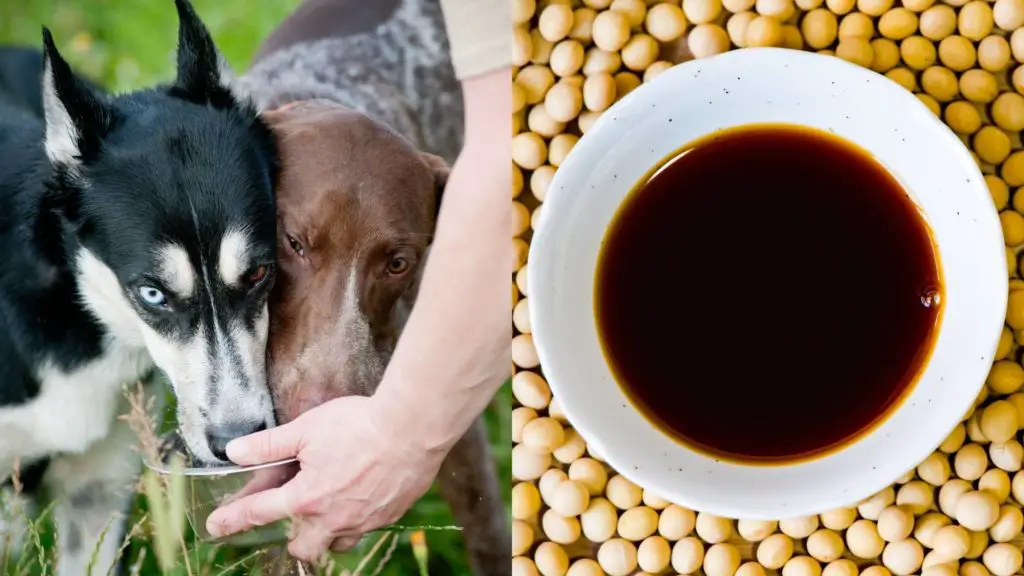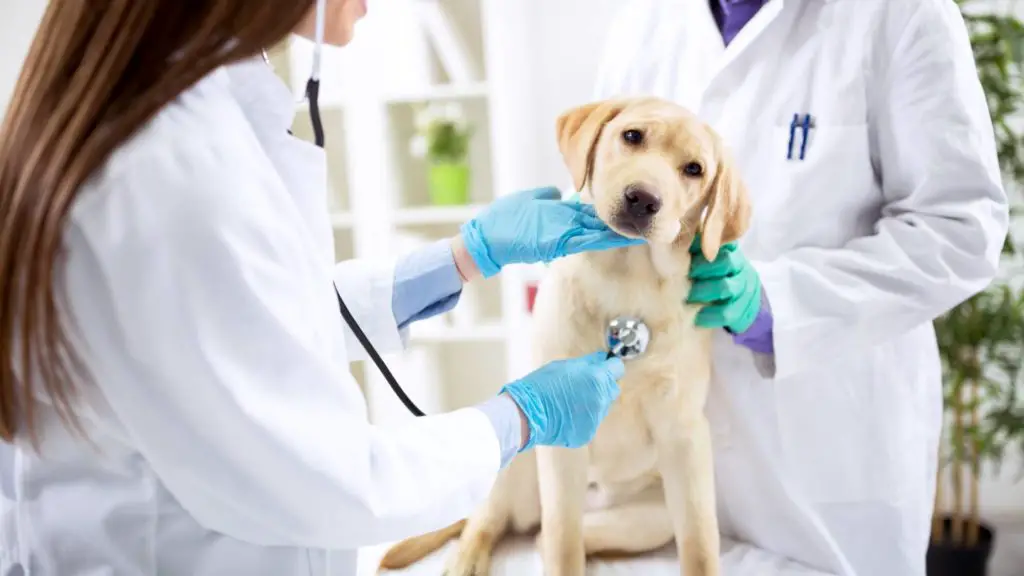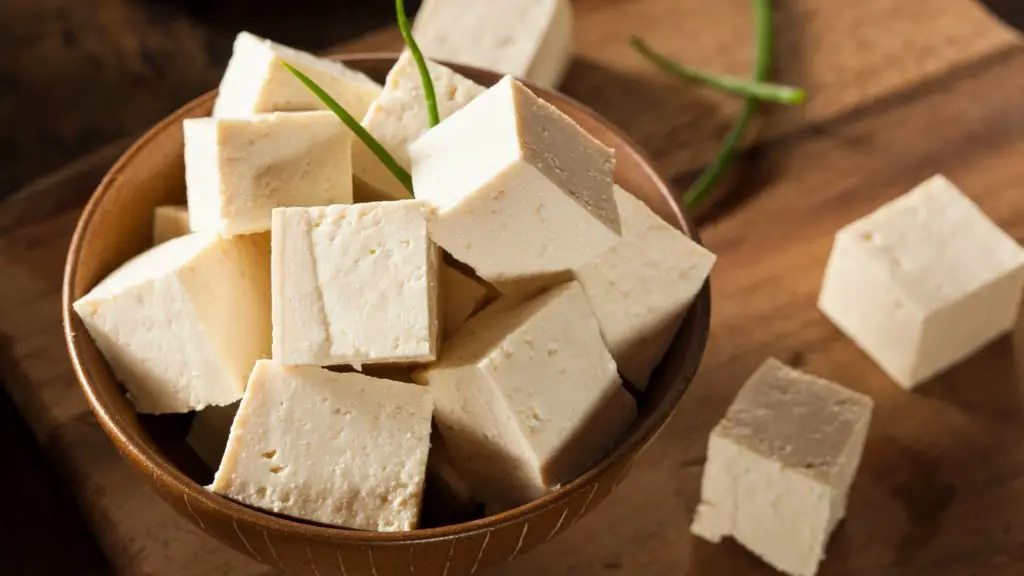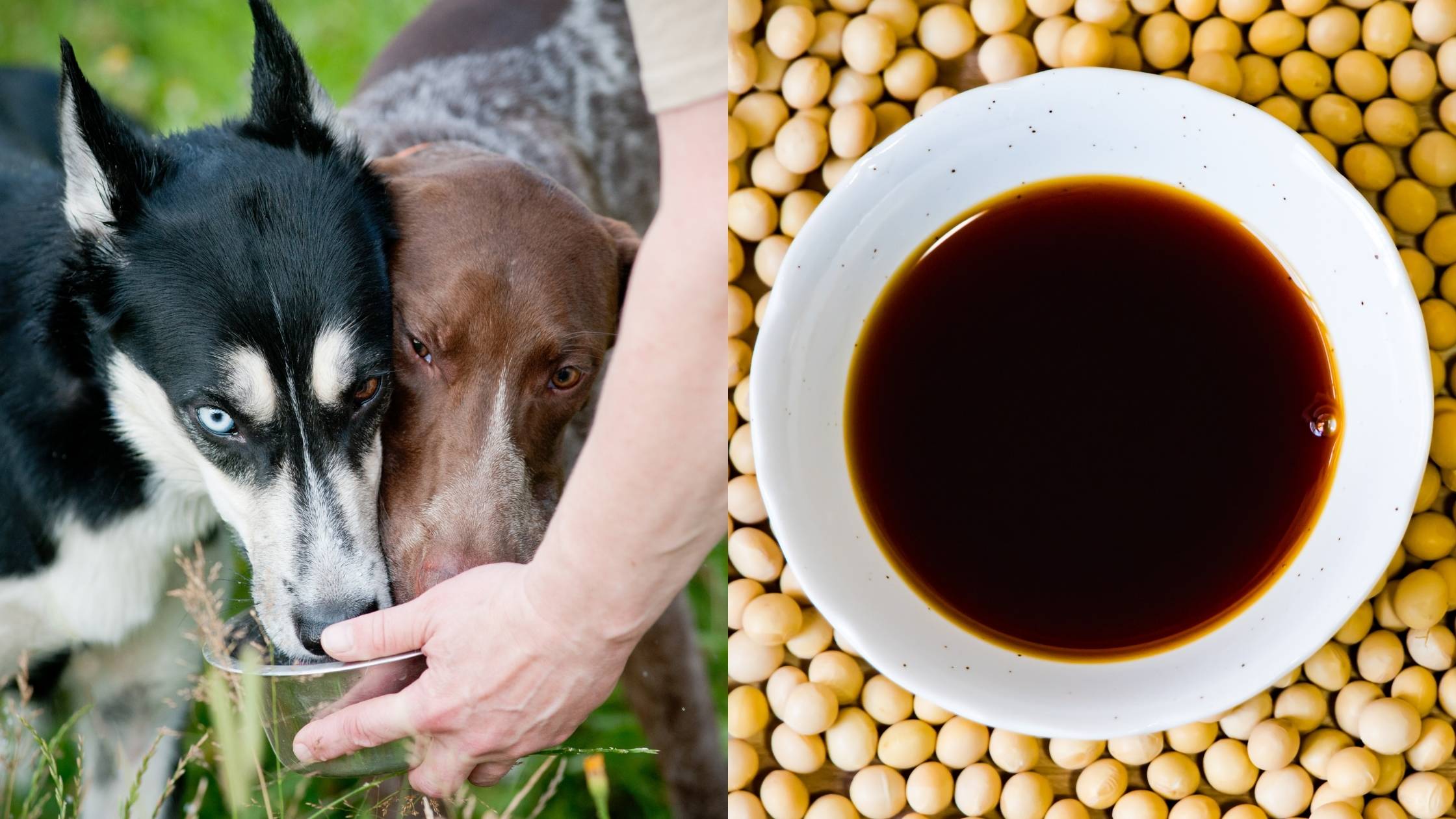Last Updated on 11/16/2021 by Veronica Jones
We all love to treat our furry four-legged friends, whether it’s to a new toy or a tasty treat that you’ve bought home for your family. But there are some human foods that dogs should never eat.
Soy sauce is a cupboard essential in many households. It is also popular in Chinese takeout and often comes in packets with your sushi.
Can dogs have soy sauce? Is it toxic?
If you are wondering whether giving your pup soy sauce will cause any harm, this article is for you. We’ve provided the answers to any questions you may have about soy sauce and dogs.
Can dogs have soy sauce?
No, canines should not eat soy sauce because it contains too much sodium content. Excessive salt intake in dogs can cause salt poisoning and kidney failure if consumed in large amounts.
What ingredients in soy sauce are bad for dogs?
Whilst soy sauce isn’t toxic, it does contain ingredients that could be bad for your pup’s health. Soy sauce is made from soybeans, wheat, salt and fermenting ingredients such as yeast. But why is soy sauce bad for canines?

Sodium poisoning
There’s a lot of salt in soy sauce – around 2.75g per tablespoon. Dogs need salt in their diet to maintain blood volume but canines should only have around 13 mg/kg body weight or 0.2 g/1000 kcal.
Eating large amounts of salt can be very dangerous for canines. Their digestive systems can’t process and digest it in the same way as a human’s body can. The consumption of soy sauce in large quantities could cause health issues such as digestive and kidney problems.
Salt poisoning in canines should be treated as a medical emergency. In rare cases, it can even be fatal. Contact your veterinarian if you think your dog has consumed too much salt or shows any of the symptoms of salt poisoning listed below.
If a dog eats too much salt, he will naturally be thirsty and try to drink more water to quench his thirst and prevent damage from being done to his body. However, if your pooch ingests too much salt over a short period of time, the cells in a dog’s body start to release water to try to balance the excess amount of salt. This process damages brain cells and can cause neurological symptoms such as headaches and seizures.
Symptoms of salt poisoning in dogs:
- Stomach pains
- Loss of appetite
- Swollen tongue
- Vomiting
- Diarrhea
- Convulsions
- Extreme thirst and urination
- Muscle spasms
- Loss of energy and appetite
- Difficulty breathing
Salt poisoning is likely to require IV fluid therapy and electrolytes to control the dehydration. Your vet will gradually adjust the salt levels in your dog’s body to avoid a sudden change in sodium levels, which can cause a heart attack or brain swelling.
Too little salt in a dog’s diet can also negatively affect his health. Lethargy, growth problems, low energy, trouble balancing and fur loss are common signs that your pet isn’t getting enough salt. Whilst pups need salt in their diet, this shouldn’t be given to canines in the form of soy sauce or other human foods. Dog foods contain all the nutrients and minerals they need to maintain a healthy body.
Kidney failure
The dehydration caused by high salt levels could cause kidney failure in dogs. Kidneys remove toxins from the blood and excrete them via urine. These vital organs also regulate blood acidity levels and blood pressure.
Kidney failure in dogs is either acute or chronic. Acute kidney failure can be reversed if treated early, but chronic kidney failure can only be managed and slowed down. If your pup suffers from acute kidney failure from salt poisoning, he will need to be treated in a veterinarian hospital through fluids, antibiotics and medication.
Signs that could indicate kidney failure in your pet include:
- Drinking less or more water
- Excessive urination
- Decreased appetite
- Weight loss
- Blood in urine
- Pale gums, bad breath or mouth ulcers

Garlic and onions
Onion and garlic are common ingredients in soy sauce. They belong to the Allium family of herbs, which are highly toxic to dogs. Excessive salivation, mouth irritation, vomiting and diarrhea may be early signs of toxicity in dogs. The most dangerous part of these herbs can damage your pup’s red blood cells, preventing oxygen from being carried around his body. A rapid heart rate, panting, weakness and discoloured urine are all signs that your dog has eaten something he shouldn’t and an emergency trip to the vet is required.
Yeast
Soy sauce contains yeast, which is extremely bad for dogs. Why is yeast bad for dogs? The fermenting ingredient can expand inside a dog’s stomach, causing bloating. Bloat in dogs should be treated as a medical emergency. Sometimes it turns into a life-threatening condition called Gastric Dilation Volvulus (GDV). If you suspect that your dog has a swollen tummy, speak to your vet immediately as symptoms of GDV can become worse quickly. If your vet confirms that your furry friend has a bloated or twisted stomach, surgery may be required.
Common symptoms of bloating in dogs include:
- Breathing heavily or shallowly
- Drooling
- Trying to vomit
Yeast also produces alcohol during the fermentation process which puts your dog at risk of alcohol poisoning from it being absorbed into your pup’s bloodstream. Depression, lethargy, drooling, retching or vomiting, weakness, collapsing, low blood pressure and a decreased respiratory rate are all signs that your pup might be suffering from alcohol poisoning.
What to do if your dog accidentally eats soy sauce
So your dog ate soy sauce. Here’s what to do next.
If you find your dog eating soy sauce, remove it immediately.
If your dog consumes soy sauce, monitor your pooch carefully and check for any symptoms mentioned above. Try to find out exactly how much soy sauce your doggy has consumed. This information could be vital to help your vet provide the right care and treatment options to your pup. If your pet has only eaten a small amount of soy sauce, give them lots of fresh water and they will naturally flush out the salt when they urinate.
If you witness any severe reactions or are concerned, speak to your vet or take them to the nearest clinic. Sometimes, drinking water is enough to help flush the salt out of your dog’s body. However, you should always consult a qualified veterinarian and follow the advice given before trying anything at home.

Can puppies eat soy sauce?
No, soy sauce should never be fed to dogs or puppies. Excessive levels of salt in a growing pup’s diet can be detrimental to their health and even fatal. Follow your vet’s advice on how much salt you should be giving your puppy. Dog food is designed to contain everything you need, so you won’t need to feed your pet any additional salt.
Can dogs eat other kinds of soy foods?
Other soy foods can provide some health benefits to canines, including a good source of vitamins, fibre, potassium, amino acids and folic acid.
Here are a few dog-safe soy products that you can feed your pup in moderation.
Soy milk – if dogs eat dairy products regularly, they can experience digestive issues and intestinal upset. Some canines are also lactose intolerant. Soy milk is a safe alternative to dairy for dogs. Soy milk is made from soybeans, which contain protein. Protein is essential to ensuring your dog’s body can function properly. The amino acids in protein also help maintain healthy skin, hair and promote tissue growth and repair.
Your dog may get an upset stomach if he has too much soy milk but that’s the only negative effect that it could have on your dog’s health. Soy milk is also high in calories and added sugar, which means consuming too much could lead to tooth decay and obesity for your pooch. If giving soy milk to your pet, always choose one that doesn’t contain xylitol, an artificial sweetener that is poisonous to dogs.
Soybeans – the protein content in soybeans means that they can substitute some of the meat in your dog’s diet. Soybeans are a good source of amino acids, magnesium, copper, potassium and omega 3 and 6 fatty acids. Fatty acids help support a healthy immune system, coat and nervous system. Soybeans are high in fibre, so they could be a good option for your pooch if he needs to lose weight as it can help your pet feel fuller for longer.
Tofu – whilst tofu is safe for doggy consumption, it shouldn’t replace your dog’s main source of protein in his diet. Dogs who suffer from digestive issues are often given soy protein such as tofu a plant-based protein. If serving tofu to your four-legged friend, don’t add any seasoning, spices or sauces that could contain harmful ingredients. If consumed in large amounts, your pooch could suffer from gas and bloating. Tofu can be enjoyed by canines in small amounts but shouldn’t consume it regularly in replacement of your dog’s usual food.
It’s possible that your pup could have a soy allergy. Depending on the severity of the allergy, your pet could experience hives and diarrhoea or anaphylaxis in extreme cases. Always consult your veterinarian before feeding new foods to your dog. If your pooch shows signs of discomfort after eating soy, don’t give him any more until you have spoken with your vet.

Are there any sauces safe for doggy consumption?
Is it safe to give your pet other soy foods? Giving foods designed for human consumption to your pet should be done with caution.
Hoisin sauce – this sweet-spicy sauce is commonly used in stir-fry dishes and other Chinese food. Like soy sauce, hoisin sauce contains dangerous levels of salt for canines and should be avoided. Other ingredients such as garlic and chilli could also make your pet extremely sick.
Fish sauce – whilst the ingredients in this sauce are not toxic to canines, they are not good for them either. Fish sauce typically contains salt, anchovies and water. If your pup consumes too much fish sauce he could suffer from vomiting, a poorly tummy and even salt poisoning.
So, can dogs eat soy sauce?
As responsible pet parents, you should never feed your dog soy sauce. Keep soy sauce and foods that contain soy sauce well away from your pets. Even just a tablespoon of soy sauce could cause vomiting and diarrhea. Always check the ingredients of foods before giving them to your pet to make sure they don’t cause anything that could harm your furry friend.
Looking for More Great Articles About Dog Diet?
- Can Dogs Eat Tater Tots? Are They Toxic?
- Why is My Dog Losing Hair Around Their Eyes?
- Can Dogs Eat Lunch Meat (Deli Meat)? Is it Harmful?
- Can Dogs Eat Sugar Cookies? Are they Safe for Dogs?
- Can Dogs Eat Meatballs? Are They Healthy?
Reference list
- Pet Poison Helpline “garlic and dogs” https://www.petpoisonhelpline.com/poison/garlic/ Accessed 13th November 2021
- VCA Hospitals “kidney failure in dogs” https://vcahospitals.com/know-your-pet/kidney-failure-chronic-in-dogs Accessed 13th November 2021
- Purina “why is protein good for dogs” https://www.purina.com/articles/dog/nutrition/why-is-protein-good-for-dogs. Accessed 13th November 2021
- PDSA “bloating in dogs” https://www.pdsa.org.uk/pet-help-and-advice/pet-health-hub/symptoms/bloat-swollen-belly-in-dogs Accessed 13th November 2021

